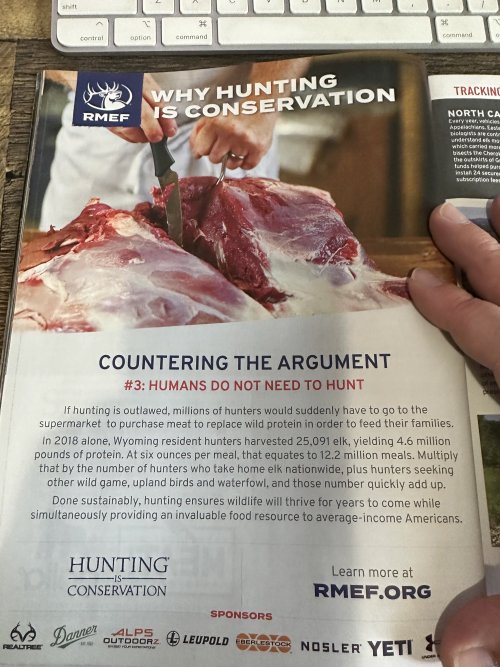D
Deleted member 52098
Guest
So I've been mulling this all over while I decide on how best to approach this issue, and similar the issues in Washington.
And some of the things I genuinely wonder about are the following:
1. Does the non hunting public and the anti hunting faction have any idea how low success rates are on hunts? or do they genuinely think we're all just out here up to our balls in Elk, etc and are just choosing which one to shoot this year?
2. Have we - as hunters, conservations orgs, etc - really laid out what the end of hunting looks like in response to anti hunting efforts from A) wildlife management perspective (predators aren't going to take care of as many as they think); B) replacing wild animal protein with domestics protein sources and the associated costs of doing so (See RMEF ad below from latest Bugle issue)
3. Do we - as hunters, conservation orgs, etc - do a REALLY bad job of displaying / portraying / articulating the conservation work actually being done? Yes, conservation results in more animals, which could increase tags. But it's not a 1:1 ratio, but I worry we don't portray enough of the actual conservation work being done. We tend to promote big hunts, successful hunts, etc rather than bragging about the genuine good that has been done. We too often focus on dollars and raffles and fundraising, rather than genuinely awesome outcomes (IMO). I also firmly believe that overly aggressive / hard stances on certain issues (wolves, etc) really paint us in a bad light and again, take away from the great work a lot of orgs and individual hunters have done.
All in all, I think we need to be more savvy and less defensive. We have a lot of facts and figures on our side that demonstrate our worth and huntings' worth, but we tend to play with fire / scare tactics / etc.

And some of the things I genuinely wonder about are the following:
1. Does the non hunting public and the anti hunting faction have any idea how low success rates are on hunts? or do they genuinely think we're all just out here up to our balls in Elk, etc and are just choosing which one to shoot this year?
2. Have we - as hunters, conservations orgs, etc - really laid out what the end of hunting looks like in response to anti hunting efforts from A) wildlife management perspective (predators aren't going to take care of as many as they think); B) replacing wild animal protein with domestics protein sources and the associated costs of doing so (See RMEF ad below from latest Bugle issue)
3. Do we - as hunters, conservation orgs, etc - do a REALLY bad job of displaying / portraying / articulating the conservation work actually being done? Yes, conservation results in more animals, which could increase tags. But it's not a 1:1 ratio, but I worry we don't portray enough of the actual conservation work being done. We tend to promote big hunts, successful hunts, etc rather than bragging about the genuine good that has been done. We too often focus on dollars and raffles and fundraising, rather than genuinely awesome outcomes (IMO). I also firmly believe that overly aggressive / hard stances on certain issues (wolves, etc) really paint us in a bad light and again, take away from the great work a lot of orgs and individual hunters have done.
All in all, I think we need to be more savvy and less defensive. We have a lot of facts and figures on our side that demonstrate our worth and huntings' worth, but we tend to play with fire / scare tactics / etc.








